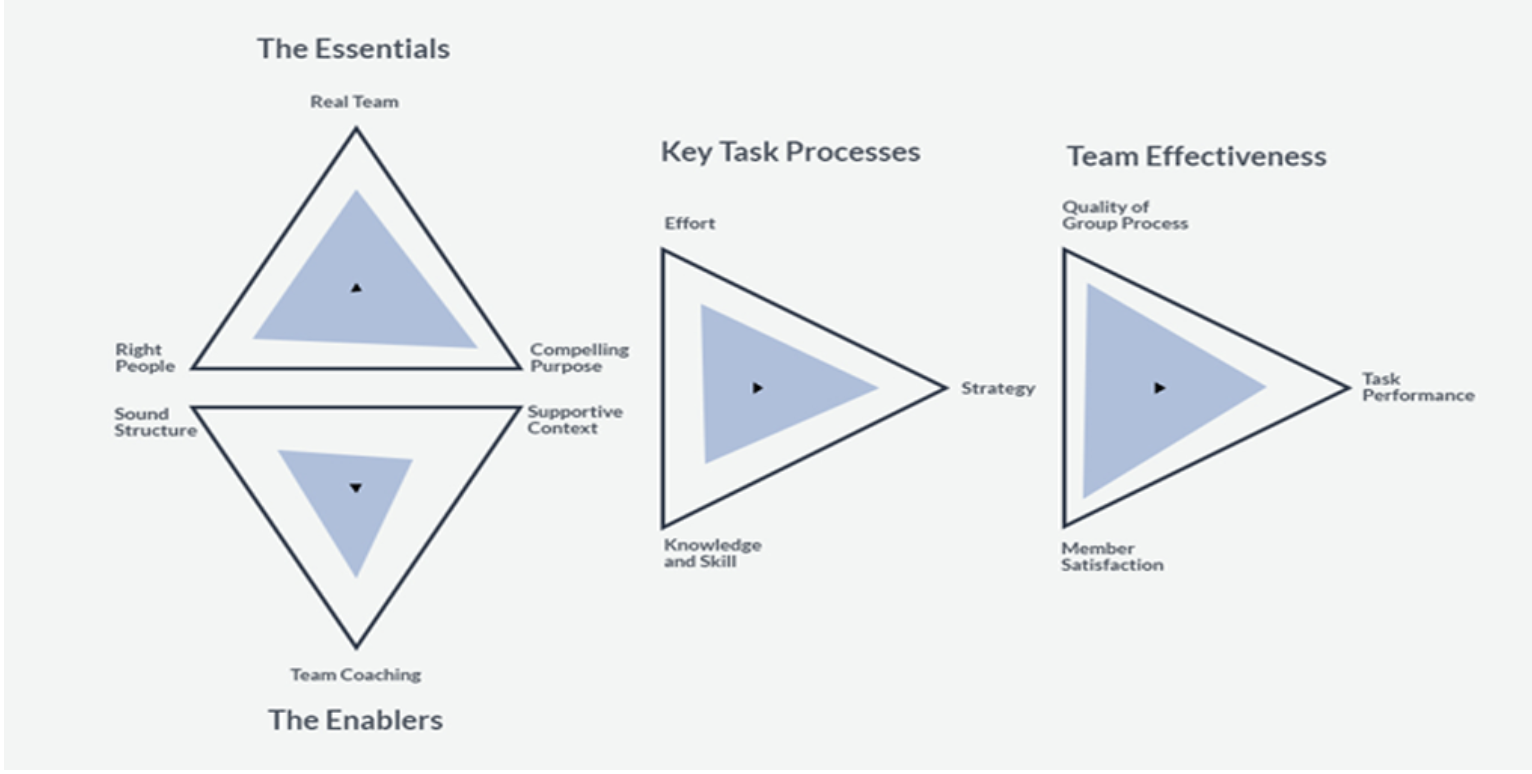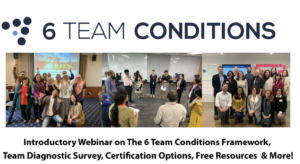
The Science and Art of Great Teams: Learn about the 6 Team Conditions
Learn about the 6 Conditions framework which helps team leaders, team members and team coaches/facilitators foster team effectiveness.
Introduction
The 6 Team Conditions framework–a leading, empirically validated and highly predictive framework based on the seminal work of Drs. Richard Hackman, Ruth Wageman and other teams scholars at Harvard University–helps team leaders, team members and team coaches/facilitators foster team effectiveness.
The 6 Conditions for Team Effectiveness framework identifies the 6 Conditions that can be deliberately designed into a team and that together create an environment where great teamwork will emerge. In our research, the 6 Conditions account for up to 80% of a team’s effectiveness.
…you can’t make a team be great what you can do is put in place healthy conditions that together stack the deck in favour of a team growing into a superb collaboration. – Ruth Wageman
The 3 Essentials
The Essentials are the fundamental building blocks of great teams.
A team with the right people has the range of perspectives needed to do the work, and the skills–including teamwork skills–to bring those perspectives to the work.
To have a great team, first and foremost you have to create a real team: one that is bounded so that members know who is on the team (and who is not), they need to work together to accomplish their work, and they are stable in membership long enough to accomplish something meaningful together.
Teams need a purpose that engages their commitment and orients them in a shared direction.
The 3 Enablers
The Enablers accelerate a team’s development into a brilliant collaboration.
Every team benefits from a few elements of healthy structure: keeping the team small enough, tackling tasks together that make sense to be done as a team, and identifying a handful of explicit norms about what they should and should not do when they work together.
Well-designed teams benefit from an expert coach who can help the team make excellent use of its resources.
Every team operates in a larger context, and the structures and systems in that context (such as rewards and information) can either promote great teamwork, or create obstacles to excellent collaboration.
The Research
The 6 Conditions for Team Effectiveness Framework comes from decades of research by leading teams scholars at Harvard University. Richard Hackman, Ruth Wageman, and their students and colleagues have studied thousands of teams around the world, in a wide range of industries, sectors, and cultural contexts. Their work identified 6 Conditions that are all actionable, designable elements of teams and together they foster great teamwork and significant accomplishment over time. The research about these 6 fundamental conditions has been published in numerous peer-reviewed journals and books. (See Publications)
Read
Explore deeper with these readings.
When and how team leaders matter, Hackman, J.R., Wageman, R.
Team leaders tend to be viewed both by lay observers and by scholars as more influential in shaping team performance than is warranted by research evidence. This chapter identifies the technological, organizational, and contextual constraints that can attenuate the impact of team leader behavior; and explores the behavioral options that remain available to leaders under constraining circumstances. We then address three decisions team leaders make that can spell the difference between team success and failure: (a) what kind of team to create; (b) how to structure the team; and (c) how and when to actively coach the team as it proceeds with its work. We propose that team leaders’ decisions about such matters often are made implicitly rather than deliberately and that they often are suboptimal. Finally, we explore the implications of our analyses for team leader training and development, with emphasis on developmental activities that can make the implicit explicit and promote continuous learning by team leaders and members.
Foster Team Effectiveness by Fulfilling Key Leadership Functions, Hackman, J.R., Wageman, R.
Written by Hackman and Wageman for practitioners who work with teams, especially new leaders. Summarizes four key principles for designing and leading teams—including asking whether you really need a team. The article summarizes the 6 Conditions framework and provides illustrations of how to bring these principles to life in practice.
Leading teams when the time is right, Hackman, J.R., Wageman, R., Colin M. Fisher
Written for those who coach teams and leaders. Leaders need two different types of great timing to help their teams. First, they understand what kinds of help to give teams at predictable times in their work cycles. Second, they know how to influence their teams on the fly, sensing those unpredictable moments when a well-aimed intervention can help a team get onto a productive track. Drawing on examples from our own and others’ research on team leadership, we show how effective team leaders take advantage of the special leadership opportunities in the life of a group to create the conditions for superb team performance.
Listen
Explore the Science and Art of Great Teams through the 6 Conditions podcast with show hosts Dr. Ruth Wageman and Dr. Krister Lowe. The show explores how the 6 Team Conditions framework–a leading, empirically validated and highly predictive framework based on the seminal work of Drs. Richard Hackman, Ruth Wageman and other teams scholars at Harvard University–helps team leaders, team members and team coaches/facilitators foster team effectiveness.
The show unpacks the structural design conditions as well as the emergent process dynamics that drive great teams. Dr. Ruth Wageman is a leading scholar-practitioner in the area of team effectiveness and is the author of “Senior Leadership Teams: What It Takes To Make Them Great” and the Team Diagnostic Survey. Dr. Krister Lowe is a thought leader in the emerging profession of team coaching and is the former host of the Team Coaching Zone Podcast which developed a listenership in more than 137 countries around the world.
Watch

Watch videos such as An Introduction to the 6 Team Conditions Framework, Team Diagnostic Survey & Virtual Certification Options.

